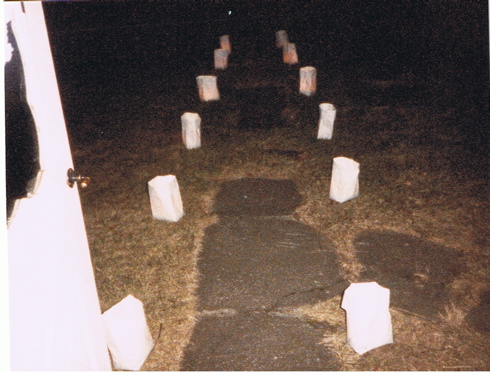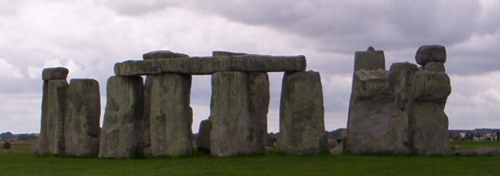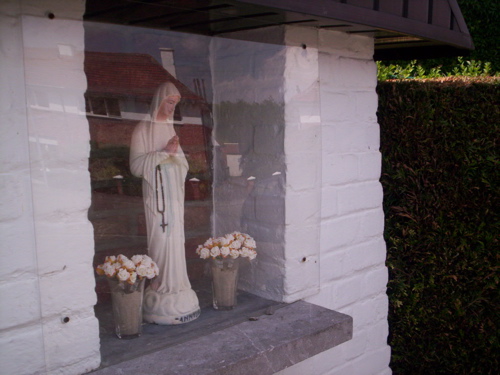 I want to begin a difficult yet basic conversation about spirituality and religion. In part, because of my own journey through institutions (primarily religion, education, and marriage), and what those experiences collectively are teaching me to carve a life in a world entrenched by institutions.
I want to begin a difficult yet basic conversation about spirituality and religion. In part, because of my own journey through institutions (primarily religion, education, and marriage), and what those experiences collectively are teaching me to carve a life in a world entrenched by institutions.
Photo by Margaret (Wilson) Kowalk, 1986.
The earliest I remember debating spirituality was at the age of twelve on the phone with an atheist classmate who questioned my belief in God, a belief not fashioned by a family’s adherence to the institution of religion but by an unexplainable, unwavering knowledge that God exists. From where I stand now (albeit “a stand” that moves about), I hear echoes of that early conversation years later in a bar with a feminist, Marxist, graduate-school classmate as we compared Jesus Christ and Karl Marx.
In conversations today, I hear a struggle to distinguish spirituality from religion. So in this first post of a series under the column “Breaking the Silence”, I begin unpacking lessons from my journey, an ongoing process of recovery and discovery. Your thoughts, questions, and experiences are welcome to the table, and I look forward to a rich, challenging exchange.
SPIRITUALITY VS. RELIGION

Photo by MDH. Stonehenge, 2007.
Most basically, I see institutions as spaces based upon absolute certainty – that is capital-T Truth. Institutions stand upon fixed ideas with gates that admit and dispel according to their tenets. From this basis, religion as an institution is based upon fixed ideas regarding spirituality, which is not its equivalent. In a real sense, institutional religion attempts to harness spirituality.
I am talking about spirituality as “the internal” – a connection with one’s self, the world, its people, and the circumstances we create. “The external”, in tandem, is the world, the people in it, and events happening day-to-day. Institutions such as religion, then, are spaces of “the external”. In a future post, I will explore details for these terms and their relationship.
My spirituality had been harnessed by Protestant White-Middle-Class Church, the name I collectively give to the individual churches in which I participated for a decade. Naming the religious institution from my experience is a tactile or “hands-on” way to identify the particular space of that spiritual training.
JUDGE VS. LOVE
 Protestant White-Middle-Class Church trained me to maintain absolute certainty about spirituality for others and myself, while supposedly maintaining humility toward my fellow mortals and especially toward God. In other words, I was trained to judge and to love – unavoidably a contradictory pair. Contradictory not in the sense of poles from a common sphere, such as the yin-yang, the female-male, the dark-light; but in the sense of puzzle pieces from different puzzles, which fail to fit one another no matter their arrangement.
Protestant White-Middle-Class Church trained me to maintain absolute certainty about spirituality for others and myself, while supposedly maintaining humility toward my fellow mortals and especially toward God. In other words, I was trained to judge and to love – unavoidably a contradictory pair. Contradictory not in the sense of poles from a common sphere, such as the yin-yang, the female-male, the dark-light; but in the sense of puzzle pieces from different puzzles, which fail to fit one another no matter their arrangement.
I could not live practically – nor peacefully – with this contradiction, and I came to reformulate the paradox of judging and loving in the context of knowing and seeking. Was my spirituality to be based on certainty or curiosity, on openness or closed-ness, on condescension or humility? I chose to call myself a Seeker, someone open to learn anew the lessons fixed all those years. I chose to focus on fulfilling my path with lower-case-t truth, which is open to revision, rather than confining others and myself to boxes of absolute certainty or capital-T Truth.
DOUBT VS. OPENNESS
Now I attend quiet meetings with Quakers and simultaneously learn about star mythologies – the lunar zodiac of the Celts, a solar-based zodiac often called “Western” astrology, the Cherokee day signs. I compare the Christian-inspired masculine trinity (Father, Son, and Holy Ghost) and the feminine Triple Goddess from many cultures.
Photo by MDH, Raven Wing, 2008.
 Yet I have been selective about whom I talk with about what I am learning and studying on my spiritual journey. It is not because I doubt myself but find that the doubts of others sometimes taint my hope and peace. Doubt itself is not toxic; how one responds to and uses doubt, though, may work out as inspiration or humiliation of one’s self or another.
Yet I have been selective about whom I talk with about what I am learning and studying on my spiritual journey. It is not because I doubt myself but find that the doubts of others sometimes taint my hope and peace. Doubt itself is not toxic; how one responds to and uses doubt, though, may work out as inspiration or humiliation of one’s self or another.
To be open to possibility is not the same as living in doubt. To know in this moment, space, place – dimension, incarnation, universe – that I am where I am and nowhere else, in the now and not a past or future or another simultaneous time, is not to live in absolute certainty. It is to live openly, recognizing that possibility is circumstantial, karmic, steadfast, and dynamic. The closest to certainty from this supposition – not a fixed position – is that possibility is; possibility is a coming and going, an ebb and tide.
(Note: By “another simultaneous time” I mean the same moment in another time – for instance, when an eclipse happens simultaneously for everyone on earth and marked distinctly by each person”s time zone.)
CLOSING
I believe that a difficult yet basic conversation about spirituality and religion is worthwhile, and it”s my hope that you are joining the series as a contributor. I intend to incorporate responses as much as possible into my future posts. So let the replies begin! And in closing, I share an excerpt from my 3 August journal entry, which I suspect is a poem titled “Seeker”:
- “Today I seek balance of body and mind. I seek quiet and self-realization. I seek stillness, clarity, undoing. I seek my higher self and the divine. I seek without end, embracing the eternal. I seek wholeness in the lack thereof, in the absence of, in the imperfection of. I seek and I will find in the seeking.”
*********************************************************************
Breaking the Silence is a series of essays by Melissa Dey Hasbrook. The series’ concept is explained here: What Do You Think?.
Post updated: 28 January 2009.

Spirituality & Religion by Melissa Dey Hasbrook is licensed under a Creative Commons Attribution-Noncommercial-No Derivative Works 3.0 Unported License.


Thanks, Paul, for taking the time to share your thoughts:
http://deyofthephoenix.com/blog/?p=15#comment-34
I completely agree that not everyone who participates in a religious institution takes the position that their faith is based on absolute/ capital-T truth.
“Idolatry around doctrine” is a new phrase for me, which I appreciate hearing related to Christian-based faith. Brings to mind anyone who focuses on the letter of the law instead of the spirit of the law, like those pesky Pharisees.
The approach of no doctrine also is interesting. Who “fits” that camp from contemporary Christian-based institutions? Do the Quakers, or Unitarian Universalist churches? Appreciate your insights on the matter.
Religion and spirituality are, indeed, separate for me. One is “form” where the other is “substance”; one is codified where the other is “Godified” if you will.
In organized religions, I often find myself on the fringes (or dangling from them), whereas within my own view of spirituality, I have brief moments of connectedness to Spirit. It’s those brief moments that keep me seeking, delving deeper, no matter how murky the depths may seem.
“Godified” – I like that, Yvonne.
I’ve used “Churchified” to describe someone who’s gone down the training path I did with Protestant White Middle-Class Church.
I’m honestly not aware of a cohesive non-doctrinal approach to faith coming from out of the Christian tradition other than the one I wrote, which, in a way, is what led me to write it.
Unitarianism is tolerant of a wide range of beliefs; Quakers and certain other denominations emphasize the contemplative dimension of Christiantity. But I think they would still view Christian doctrine as essential.
I’d started the book before going for my master’s at the U of Chicago Divinity School. I went there to see if the the way that I’d begun to conceptualize my experiences made sense, since I hadn’t studied religion.